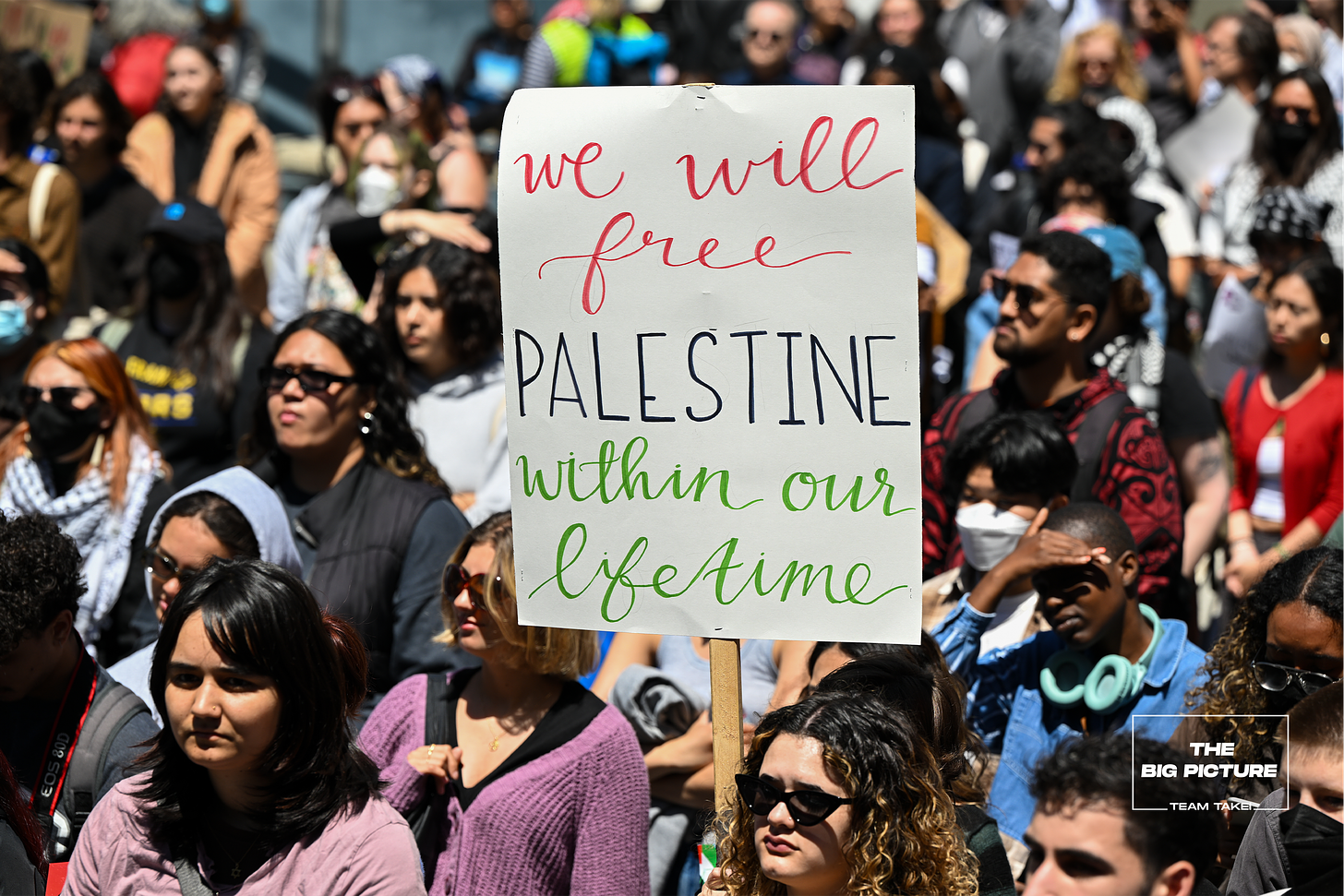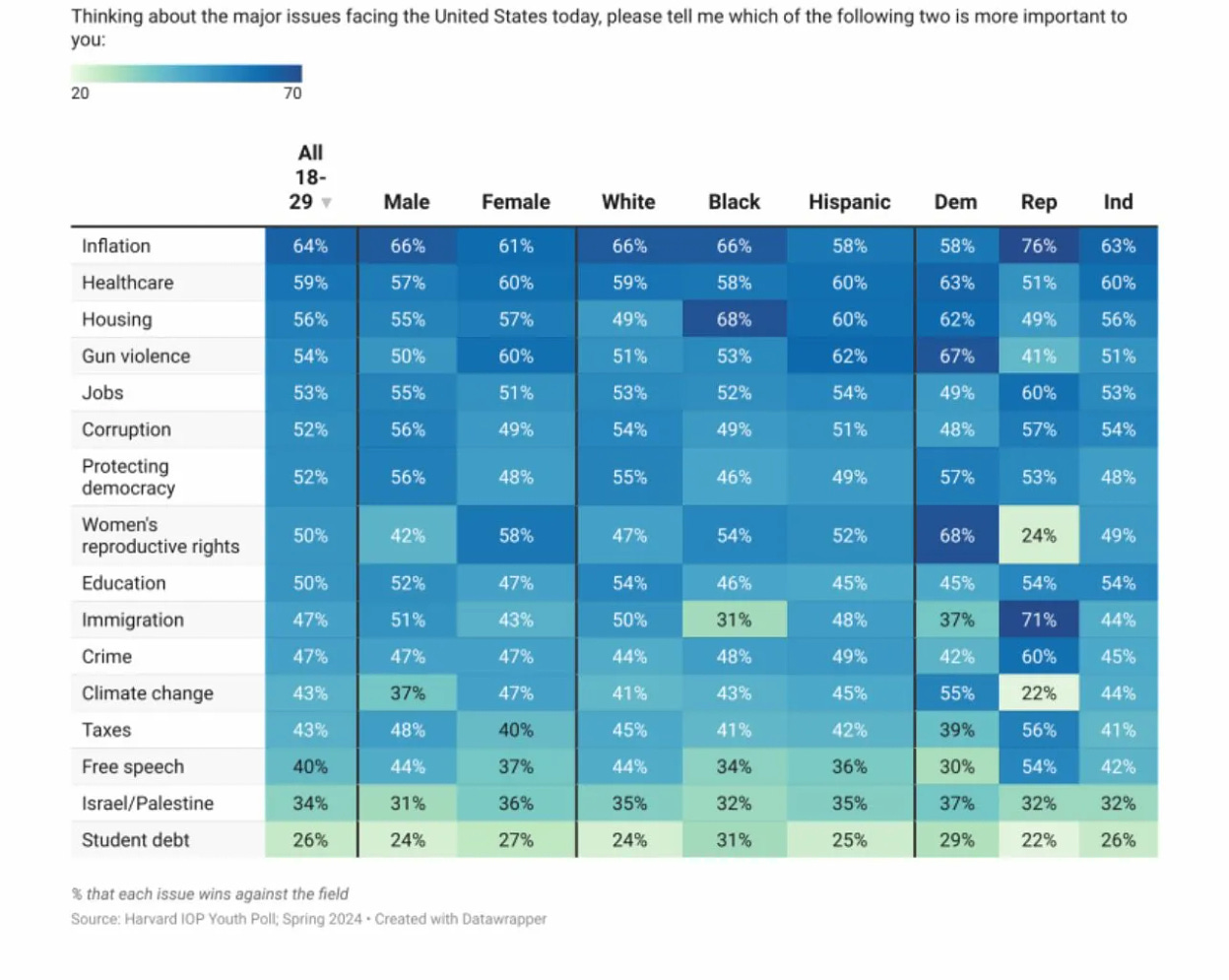Will The War in Gaza Sink Us In November?
How to talk to folks who say they won’t vote for Biden over the war in Gaza.

Most of us know someone on the left who is dug in against voting for Joe Biden because of U.S. policy toward Israel and Gaza. For them, the continued support of Israel and the flow of weapons is a dealbreaker, and they say they can’t support a president for reelection who would back a genocidal campaign against the Palestinians.
No amount of “but he’s a good man” or “the alternative is an even worse nightmare” reasoning seems to move them from their position. And it appears they are not alone. As protests emerge around the country on college campuses and in some cases turn ugly, many wonder whether the damage will deal a mortal blow in November.
After all, if blue voters, particularly young voters who have formed such a key part of Democratic electoral victories in the past three elections, stay home instead of voting to reelect Biden, it could usher in another Trump win. This is particularly worrisome in key battleground states like Michigan, where there are large numbers of Arab Americans who cannot see themselves voting for Biden.
So how do we talk to our fellow Democrats for whom Gaza is a huge, seemingly insurmountable hurdle? And how worried should we be about the war in Gaza keeping voters, particularly college-age voters, home on Election Day, or even causing them to lodge protest votes with one of the spoiler candidates?
At the risk of sounding like a political advice columnist, I take these two questions on below.
When they don’t want to hear about voting for Biden
I was at a gathering in San Diego recently, where I’d met with around forty local readers of my newsletter. I’d opened the floor up for a general discussion about the state of our politics, and a gentleman in the audience told me about a friend of his. That friend is a volunteer in the LGBTQ community and has solid progressive views, but is so disillusioned with Joe Biden over Gaza that he can’t ever see himself voting for him. He even rails daily about “Genocide Joe.”
What can we do to reach people like that, the gentleman asked me.
I replied that I have the pleasure of serving on the board of an organization devoted to human rights, and we had just held lengthy, internal discussions about what the best approach is when the subject of Gaza and Joe Biden comes up. Here are some key takeaways.
Don’t dismiss their anger and pain. For people who consider themselves progressive, the war in Gaza with its high civilian casualties can create a strong sense of turmoil, disillusionment, frustration, and even stronger emotions like fury and disgust. Most Democrats I have spoken to fall somewhere along this spectrum, myself included. While it may feel good in the moment to grow indignant, it is ultimately unhelpful to question anyone’s passion, commitment, and emotional investment in the Gaza crisis. Instead, we should acknowledge it and give it the respect it deserves.
Don’t tell them they are only hurting the ones they want to help. A common response to those who say they can’t support Biden or the Democrats ever again is to attempt to move to a logical, cost/benefit style analysis. The thinking goes something like, “If you really care about Gaza, then you’ll vote for Biden and the Democrats, because a vote for anyone else, or any non-vote, will hurt the very people you purport to care about.” There are a couple of problems with this approach. First, this is basically telling them that they don’t have a real choice in who to cast their votes for, when in fact they do. Second, such logic forces them to be complicit, at least in their minds, with something they abhor. It’s not a strong starting point.
Don’t make this a choice about the “lesser of two evils.” Another common approach is to argue that this is about making the choice that is less evil or harmful than the other. But this rarely works because 1) in their mind, nothing could be more evil or harmful than genocide, and 2) foisting a choice of a lesser of two bad options often results in apathy, meaning folks stay home or vote third party.
So how could this delicate issue be approached instead? Here is a summary of some thoughts that others, who have spent significant time in the political trenches on this, shared with me:
Say you feel conflicted, too. Forming a bridge of understanding with those who are suffering anguish at the role our country and this administration are playing in Gaza is foundationally critical to having any kind of productive discussion. Expressing your own emotions—whether it’s frustration, horror, pain, sorrow, confliction—will open a patch of common ground on which real dialogue can happen. It is an invitation to share more, not shut down. And talking with someone who also hates what’s happening in Gaza but arrives at a different result on how to act on it can be illuminating.
Talk about other issues that matter to you. This is a key point. When someone is stuck on the narrative that “Joe Biden is bad,” you should move away from talking about the candidates (Biden v. Trump) and talk instead about all the issues that matter to you. This election is about Gaza, yes. But it’s also about many other things:
Reproductive freedom and a right to abortion that was stripped away from millions of women overnight;
Threats to democracy and rule of law from autocratic leaders and their enablers in the Republican party;
Reducing the use of fossil fuels and addressing the global threat of climate change;
Supporting our allies in NATO and Ukraine fully against Russian aggression;
An economy that focuses on the needs of the people at the bottom and the middle, not those at the very top;
Reducing gun violence and the need for sensible gun safety legislation, all currently opposed by Republicans;
A humane and functional immigration policy that doesn’t demonize vulnerable migrants;
Compassion and full equality for the LGBTQ+ community, particularly trans youth in need of gender-affirming medicine;
and many more. I have found that most people who demand an immediate ceasefire in Gaza and the end to U.S. military support for Israel also will agree with me on the need to protect and press forward with all of the above, and not allow Republicans to seize control and move us backward or toward authoritarianism.
Ask them what else matters to them. You won’t be able to convince voters that they are wrong for standing on the Gaza issue and not supporting Biden. How they ultimately vote is something they will have to arrive at in just over six months, and each journey will differ. All anyone can do now is seek to expand the discussion beyond the war to include all of the other things that also matter to progressive voters. From there, they’ll have to make up their own mind, but you will have left an opening. Let them say aloud what else they care about, and then let them make their own decisions.
The youth vote isn’t disintegrating
While it’s important to know how to engage in a productive discussion with anti-Biden Gaza protest voters, it’s also important for us to be clear-eyed about how big an issue the war really is among young voters, at least right now.
If we went by the headlines and 24/7 coverage of college protests on cable news networks, we might assume that Gaza and Israel are a top priority among voters under the age of 29 and could become a single-issue nightmare for the Democrats in November.
But the data we have suggest otherwise. For example, a recent quarterly poll by the Harvard Institute of Politics, with a high-sample rate of voters between the ages of 18 and 29 (and a high success rate lately of predicting youth voting) placed Gaza and Israel relatively low among priorities for young voters.
According to Simon Rosenberg, a Democratic strategist who was one of the few to predict the failure of the vaunted “Red Wave” in 2022, there were three key takeaways from that poll:
Vote intent right now is where it was in the spring of 2020, a very high turnout year for young people. Young people are engaged, paying attention.
Biden is close to 2020 results with likely 18-29 year old voters. Work to do, but we can — if we do the work — hit our 2020 numbers with 18-29 year olds in vote share and overall turnout. This is good.
Israel-Palestine is not a major issue for young Americans right now, and is in my view very unlikely to be one in the fall. This finding is confirmed in other polls. It’s an important issue, of course, but for young people there are many issues which matter much more. Note the top 6 issues for 18-29 year old self-identified Democrats:
women’s reproductive rights
gun violence
healthcare
housing
inflation
climate change
Of course, I’m one of the last people who would say we should put our faith in polls. They are simply information points, and not generally predictive of election results this far out. That means a lot could still change, and sentiment could shift, for or against the Democrats. We have much to do.
Moreover, certain swing states, including Michigan and Wisconsin, did see a significant, coordinated protest vote against Biden in the primaries (though not as high as the protest that “Haley voters” exhibited against Trump). The Biden Campaign is working hard to win back voters there, and I take some comfort in the fact that those who protested with their votes were engaging with the candidate to send a message, rather than disengaging completely.
That means we can still win them over if we approach discussions respectfully and openly. We are their fellow liberals and progressives, and we also want to fight for peace and for a better, freer, safer, cooler world. In an election where we will need every vote we can get, we need to be smarter about communicating with the voters who remain reachable, even if the gap seems too wide to bridge today.
As the election comes into clearer focus, most Democrats, even young, disillusioned ones, will be coming home. Let’s be sure to keep the path open and the light on for them.





